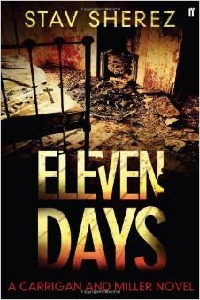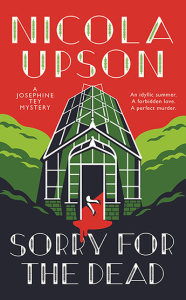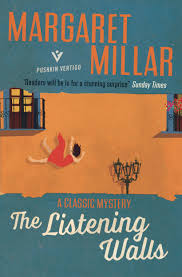Eleven days – Stav Sherez
 London-based author Stav Sherez has published two novels hovering between crime and horror fiction (‘The Devil’s Playground’ and ‘The Black Monastery’) before starting his police procedural series featuring DI Jack Carrigan and DS Geneva Miller, of which ‘Eleven Days’ is the second instalment.
London-based author Stav Sherez has published two novels hovering between crime and horror fiction (‘The Devil’s Playground’ and ‘The Black Monastery’) before starting his police procedural series featuring DI Jack Carrigan and DS Geneva Miller, of which ‘Eleven Days’ is the second instalment.
Boy & Girl investigative pairs have become something of a canon in contemporary British crime fiction: from S. Kernick’s Tina Boyd and Mike Bolt to S. Bolton’s Flint Lacey and Mark Joesbury (I’ve just read the 2011 opening novel of Bolton’s series, ‘Now You See Me”, it’s brilliant!), and, away from the capital, Scots sleuths Siobhan Clarke and John Rebus (I. Rankin) and Diane Fry and Ben Cooper (S. Booth) from the scenic Peak District in Derbyshire.
Boy & Girl, like Jack Carrigan and Geneva Miller. The former is a classic maverick cop with an unhappy past (he has tragically lost his wife), a dark horse who’s not exactly loved by his bureaucratic commanding officers but is respected for his acumen and tenacity. And for the fact that the rank and file in his investigative teams would go to any lengths for him. Geneva is instead young and inexperienced, but she’s gritty, possessed with no little skills in getting into trouble but also plucky enough to sort herself out.
Ten nuns have died in a fire that looks like arson, in their house-convent in central London: all of them apparently still seated around the refectory table, no one of them making any attempt to flee the fire. This is the puzzle that Carrigan & Miller must solve, eleven days before a chilly, snowy Christmas. Sherez, after the classic Scandinavian noir tradition, pulls no punches when it comes to tackling thorny social issues: in ‘Eleven Days’ the mystery’s ingredients feature teenage prostitution from Eastern Europe, the fight against drug-related offences in the city, conniving religious authorities with a hand in illegal trafficking and, to top it all, the exploitation of worker-slaves among the indigenous population by multi-national mining companies in Peru.
Quite a handful even for Carrigan & Miller: the latter, true to form, manages to land herself in deepest trouble, as she obstinately follows a line of enquiry that the top police hierarchy (in rather suspicious a manner) orders her not to pursue, and of which even Carrigan himself isn’t at all convinced.
At times the pieces of the puzzle seem to fit rather awkwardly, but Sherez does a great job of keeping the reader riveted and making his characters feel real, starting from the two lead detectives. Carrigan & Miller may not stand out as unique in the British crime fiction landscape but they have a life and a personality of their own that makes them convincingly appealing. And the same goes for the other main characters in ‘Eleven Days’.
‘A Dark Redemption’, the first novel of the series, was less pacy but perhaps more original in some of the plot elements, particularly the connection with both post-Colonial Africa of the 1970s and current African migration in London. ‘Eleven Days’ however is extremely enjoyable and makes me look forward to the next instalment of Carrigan & Miller adventures.






